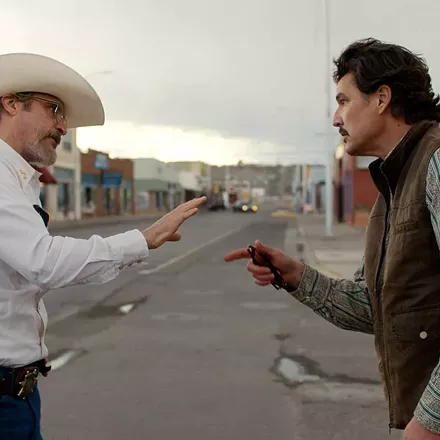Orphan: First Kill, a prequel to 2009's horror mystery Orphan, is better than its progenitor. No, scratch that: First Kill is, rather, not quite as bad as the previous movie. Still, this is a rare cinematic occurrence, and one to be commended, no matter how qualified.
The original 2009 movie played like a parody of horror movies, and, alas, not a knowing one. It had little beyond overbaked tropes of the genre: the "scary" music, the "menacing" camera angles, the telegraphing of every boo. Its big twist — look away now if you don't want a 13-year-old horror movie spoiled — was that its central "sinister child," the titular orphan, was not, in fact, a 9-year-old but actually an adult with a pituitary disorder that left her perpetually childlike in body. But she was not childlike in mind: cunning and devious, a violent, psychopathic con artist.
Anyway, the secret of the first movie is the entire point in First Kill, which rewinds to explain just how it is that Leena, a murderous 30-year-old criminal incarcerated in Estonia, ends up playacting an American waif called Esther. Now, the 2009 movie was, at best, a modest hit, and I'm not sure that anyone was clamoring for Esther's backstory. But we can be grateful for small favors: This screenplay (written by David Coggeshall with story by Orphan writers David Leslie Johnson-McGoldrick and Alex Mace) is more aware of the clichés of the genre this time around, and takes advantage of them in ways that offer some mild surprises.
First Kill does take an unreasonably long time to get around to those surprises, however. If I were the bailing-on-a-movie-halfway-through type, I would have given up before the stuff that makes this minimally intriguing showed up. And there are some almost insurmountable problems from the get-go. For one big thing, Isabelle Fuhrman made a memorable child-actor splash in 2009 as Esther; Orphan was shot when she was only 10 years old. But she's back as Esther, 23 when this was filmed, and her character is meant to be even younger! Director William Brent Bell engages in a lot of camera trickery to pretend that this normal-sized adult can pass as a prepubescent girl — such as using a child stand-in for long shots, and then only showing her from behind — and many of them are laughably unconvincing. But nothing can hide the fact that Fuhrman's face is now that of a grown woman. (This is probably why Esther has her back to us on the movie's poster.) If the very young Fuhrman was compelling as a creepily precocious kiddie, adult Fuhrman is... just... very obviously a grownup with a bit of a pixie face. Is there at least any sly commentary on infantilization of women in our culture? Ha! That doesn't even seem to have crossed the movie's mind.
This is one of those horror movies in which people have to behave very stupidly in order for anything to happen. Security is absurdly lax in the Estonian facility that Esther escapes from, even though they know how wily and dangerous she is. It is ridiculously easy for her to pass herself off as the missing daughter of a wealthy American couple, the Albrights (Julia Stiles and Rossif Sutherland), with a story about how she was kidnapped and trafficked to Eastern Europe. (She Googled to find missing-kid alerts.) Questions abound: Did no one think to do a DNA test? Wouldn't there be an alarm from the institution she escaped from, like: Be on the lookout for this grownup who looks like a kid, and here's a photo? How does almost everyone just look right past all the red flags even they acknowledge that Esther raises? There's no suspense here at all... until the moment that Esther realizes that she has a more complicated family situation on her hands than she bargained for.
What is going on with the Albrights retrospectively accounts for some of the seeming plot holes in a way that is clever, yet also way too much out of the blue: a hint that something more has been going on is needed so that it doesn't feel like a cheat. Perhaps worse than that, though, is that there is ultimately no one here to root for — or at least be riveted by in Hannibal Lecter-esque disturbing way — in First Kill. The movie doesn't compel viewers to care about anyone or anything that happens to them. ♦



























